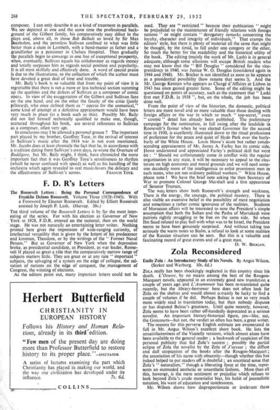F. D. R's Letters
The Roosevelt Letters : Being the Personal Correspondence of Franklin Delano Roosevelt. Volume Three (1928-1945). With a Foreword by Eleanor Roosevelt. Edited by Elliott Roosevelt assisted by Joseph P. Lash. (Harrap. 30s.) THE third volume of the Roosevelt Letters is by far the most inter- esting of the series. For with his election as Governor of New York in 1928, F.D.R. entered op the national, then on the world -stage. He was not naturally an entertaining letter writer. Nothing printed here gives the impression of wide-ranging curiosity, of intellectual versatility that is given by the letters' of his predecessor and kinsman, Theodore, or by the writings of the " Former Naval Person." But as Governor of New York when the depression broke, as presidential candidate, as President, as war leader, Roose- velt II played so great a role that the comparatively narrow range of subjects matters little. They are great or at any rate " important " subjects, the salvaging of a system on the edge of collapse, the sal- vation of nations on the edge of conquest, the;management of Congress, the winning of elections.
As the editors point out, many important letters could not be used. They are " restricted " because their publication "might be prejudicial to the maintenance of friendly relations with foreign nations" or might contain "derogatory remarks concerning the loyalty, character and integrity of individuals." That cramps the editors' style, but there is plenty of material all the same that might be thought, by the timid, to fall under one category or the other.
So much the better for the readability and the historical utility of the book. The editing (mainly the work of Mr. Lash) is in general adequate; although some allusions will escape British readers who may not know that the " Bill Douglas " considered for the vice- presidency in 1940, was Justice W. 0. Douglas (considered again in 1944 and 1948). Mr. Bricker is not identified as soon as he appears as a presidential possibility (how remote that seems !). And the Mr. George Kennan who appears as Chargé d'Affaires at Lisbon in 1943 has since gained greater fame. Some of the editing might be questioned on points Of accuracy, such as the statement that" Laski first met F.D.R. in 1938 ", but, on the whole, the job has been done well.
From the point of view of the historian, the domestic, political letters are more novel and so more valuable than those dealing with foreign affairs or the war in which so much " top-secret," even " cosmic " detail has already been published. The preliminary campaign for the nomination, in full swing after the landslide in Roosevelt's favour when he was elected Governor for the second time in 1930, is excellently illustrated down to the ritual professions of preference for the peace and quiet of Hyde Park over the hurly- burly of the White House. Louis Howe's 'acute but rather conde- scending appraisement of Mr. James A. Farley has its comic side. flowe understood and appreciated Farley 's political skill but went on : "Should we unfortunately come in conflict with the regular organisation in any state, it will be necessary to appeal to the elec- torate on high economic and moral grounds and we will need some- one decidedly more of the intelligentsia to enlist prominent men in such states, who are not ordinary political workers." White House, please note ! We have the brief note asking the then Secretary of War to promote Colonel George Marshall and a first appearance of Senator Truman.
The ware letters show both Roosevelt's strength and weakness. There is the energy, the courage, the political mastery. There is also visible an excessive belief in the possibility of mere negotiation and sometimes' a rather comic ignorance of the realities. Students of Moroccan affairs will be interested to note the President's simple assumption that ,both the Sultan and the Pasha of Marrakelh were patriots rightly struggling to be free on the same side. So when Ibn Saud refused to play ball with what was to be Israel, the President seems to have been genuinely surprised. And without taking too seriously the warm notes to Stalin, a refusal to look at some realities of the Russian situation can be seen. But this is a valuable and fascinating record of great events and of a great man.
D. W. BROGAN.


































 Previous page
Previous page